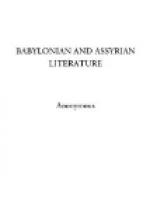“For thee! if true Heabani is thy name;
I seek the hermit seer of wondrous fame.
My king doth offer thee rich gifts of state,
And sent me to thee here to make thee great.”
“No empty honors do I seek, which void
Of all true happiness, all men have cloyed.
Return then to thy haunts of pleasure, pain,
For thy king’s embassy is all in vain.”
The seer returns within his lonely cave
And leaves the prince alone the beast to brave.
At last it slinks away within the gloom;
No more from their wild home doth either come,
Three days Prince Zaidu watches the dark lair,
But now his courage turns to blank despair:
The seer hath changed his mind since Samas sought
To urge him forth to leave his lonely lot.
The prince the mountain precipice now climbs,
And peers within while clinging to the limbs
Of stunted oaks, and views the mountain lair;
But all in vain his calls ring on the air.
Then mounting wearily his steed he turns
Away, and unsuccessful thus returns.
[Footnote 1: “Eri-ni,” cedar-trees.]
[Footnote 2: A carnivorous animal supposed to have been either a lion or a tiger, more probably a lion.]
COLUMN VI
HEABANI RESOLVES TO RETURN TO ERECH
As Zaidu sadly turns and rides away,
The hermit from his cave comes forth to pray:
“Alas! hath all these wilds their charms here
lost?
And is my breast with wild ambition tost?
My lonely cot I look upon with shame;
Again I long to seek the fields of fame,
Where luxury my remaining years
May crown, and happiness may find—or tears;
’Tis true! I should have welcomed the bar-ru;[1]
But he hath since returned to Subartu."[2]
His harp he took from its dust-covered case,
And kissed its carved and well-remembered face;
And tuning it, he glanced toward the wood,
And sang his farewell ode to solitude:
Farewell, ye mountains, woods
and trees—
My heart doth
long again for joy;
I love your wilds and mossy
leas,
But oh, your solitude
doth cloy!
I love to see the bur-khi-is[3]
Sweep stately
o’er the mossy rocks;
And tsabi[4] in a wild
like this,
Hear the tattoo
of red woodchucks.
I love the cries of lig-bar-ri[5]
The nes-i[6]
calling for their prey;
And leaping of the na-a-li[7]
That fly in wildest
fear away.
I love the bu-hir-tser-i[8]
all,
Khar-sa-a-nii
sa-qu-u-tu;[9]
Hear cu-uts-tsi[10]
with thunder roll
Across the skies
within my view.
I love to see the ca-ca-bi[11]
Peep through the
pine-trees o’er my home,
And watch the wild tu-ra-a-khi[12]
And arme[13]
welcome, to me come.




